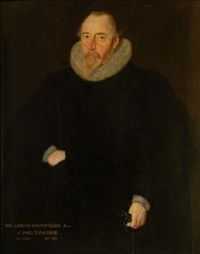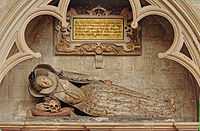Amyas Bampfylde


Sir Amyas Bampfylde (alias "Amias Bampfield" etc.[1]) (1560 – 9 February 1626) of Poltimore and North Molton in Devon, England, was Member of Parliament for Devon in 1597.
Origins
Bampfylde was the son of Richard Bampfylde (1526-1594)[2] of Poltimore and Bampfylde House in Exeter, Devon, Sheriff of Devon in 1576,[3] (whose monument survives in Poltimore Church) by his wife Elizabeth Sydenham (d.1599), daughter of Sir John Sydenham of Brympton d'Evercy, Somerset.[4]
Career
He matriculated at Exeter College, Oxford on 3 December 1575, aged 15. He studied law at the Middle Temple in 1576.[5] He succeeded to the manor of Poltimore on the death of his father in 1594. He was J.P. for Devon from 1596. In 1597, he was elected Member of Parliament for Devon. He was knighted at Windsor on 9 July 1603. He was Sheriff of Devon from 1603 to 1604. In 1616 he was Deputy Lieutenant.[4]
Marriage and progeny
In 1576 Bampfylde married Elizabeth Clifton, daughter of Sir John Clifton of Barrington Court, Somerset. The Bampfylde monument in South Molton Church shows the arms of Bampfylde impaling Clifton: Argent, semee of cinquefoils pierced a lion rampant gules. By his wife he had six sons and four daughters as follows:
Sons
- John Bampfylde (c.1586-c.1657), eldest son and heir, of Poltimore and North Molton, MP for Tiverton (1621) and Devon (1628-9). In 1602 Sir Amyas Bampfylde and Thomas Drake, brother and heir of Admiral Sir Francis Drake, made a double marriage settlement for Bampfylde's eldest son John Bampfylde, then aged 14, and his daughter Jane Bampfield, then aged 16, who were to marry Drake’s daughter and son, with each parent settling £660 on the other’s daughter.[4]
- Richard Bampfield, 2nd son, died without progeny.[6]
- William Bampfield, 3rd son.[7]
- Amyas II Bampfield, 4th son, of Weston Bampfield.[8]
- Edward Bampfield, 5th son, of Stoke Canon.[9]
- James Bampfield (d.1664), 6th son, Rector of Black Torrington.[10]
Daughters
- Dorothy Bampfield (d.1614), wife successively of Edward Hancock (d.1603), MP, lord of the manor of Combe Martin, Devon, and later wife of Sir John Doddridge (1555–1628), of Bremridge, near North Molton, Justice of the King's Bench.
- Jane Bampfield, wife of Francis Drake, son of francis Drake of Buckland. In 1602 Sir Amyas Bampfylde and Thomas Drake, brother and heir of Admiral Sir Francis Drake, made a double marriage settlement for Bampfylde's eldest son John Bampfylde, then aged 14, and a daughter, then aged 16, who were to marry Drake’s daughter and son, with each parent settling £660 on the other’s daughter.[4]
- Anne Bampfield, died without progeny.[11]
- Elizabeth Bampfield, died without progeny.[12]
Monument to daughter

A monument survives in the Lady Chapel of Exeter Cathedral to his daughter Dorothy Bampfield (d.1614), wife successively of Edward Hancock (d.1603), MP, lord of the manor of Combe Martin, Devon, and later wife of Sir John Doddridge (1555–1628), of Bremridge, near North Molton, Justice of the King's Bench, whose effigy is situated adjacent. The Latin inscription on a tablet within a strapwork surround is as follows:
- "Hic jacet d(omi)na Dorothea uxor Johannis Dioderidge militis unius justiciarioru(m) d(omi)ni regis as placita coram rege tenenda assignati et filia Amisii Bampfield militis quae obiit primo Martii Anno Dom(ini) 1614" ("Here lies Dorothy the wife of John Doderidge, knight, one of the Justices of the Lord King assigned at the Pleas held before the King, and daughter of Amisus (Latinised form) Bampfield, knight, who died on the first of March in the Year of Our Lord 1614")
Death & burial
Bampfield died at Cottonheath on 9 February 1625 at the age of 65[13] and stated in his will his wish to be "buried in North Molton church with his parents".[4][14] His monument with effigy survives in the Bampfield Chapel of North Molton Church.
Monument at North Molton


A fine stone monument to his memory exists against the south wall of the south aisle chapel ("Bampfylde Chapel") in North Molton Church. On the wall to its right is affixed a stone tablet inscribed with the following lines:
"Stand passenger gaze such was he
As thou tremble such shalt thou be
He dy'd to live so live to dye
Depart muse on eternity"
Ameae Bamfylde equiti aurato patri suo charissimo ex antiqua Bamfydeorum (sic) de Poltimore familia patre Richardo Bamfyde (sic) armigero matre Elizabetha Clifton de Barrington per 45 annos conjugato ex qua 12 filios 5 filias suscepit prudenti sed pio animoso sed affabili provido sed hospitali et benigno de suis de patria bene merito ex hac miseriarum valle anno aetatis suae 67 ad immortalitatem commigranti et sui reliquias his in terris quas post diuturna litigia et graves expensas sui posteritati foeliciter recuperavit in spem resurrectionis requiescere volenti Johannes Bamfylde filius et haeres qui etiam ex Elizabeth Drake de Buckland 8 filios et 7 filias ante patris obitum habuit anno Christi 1626 regis Caroli 2 hoc monumentum pietatis ergo posuit quas terras mea cura meis non parva redemit hae mea jure sinu molliter ossa fovent.
Translated literally into English thus:
"To Amyas Bampfylde, knight bachelor, most dear to his father, from the ancient family of the Bampfyldes of Poltimore from Richard Bampfylde, esquire, his father, from Elizabeth Sydenham of Brympton his mother; with Elizabeth Clifton of Barrington having been married during 45 years from whom he received 12 sons, 5 daughters. Prudent but with a pious spirit but easily spoken to; forward-looking but hospitable and benign, well-merited from his country. From this vale of miseries he migrated towards immortality in the 67th year of his age and having wished the remains of him to rest in hope of resurrection in these lands which after long-lasting dispute and heavy expenses happily he regained for his posterity. John Bampfylde his son and heir, who also from Elizabeth Drake of Buckland had before the decease of his father 8 sons and 7 daughters, in the year of Christ 1626, 2nd. of King Charles, therefore of piety placed this monument that these bones might gently warm the lands he redeemed not with small care".
Heraldic quarterings
An escutcheon with 30 quarterings survives above the monument to Sir Amyas Bampfylde in North Molton Church, as follows:[15]
- 1: Or, on a bend gules three mullets argent (Bampfield)
- 2: Or, a maunch gules (Hastings)
- 3: Argent, a lion rampant sable (Huxham)
- 4: Argent, on a fess sable three cross crosslets or a bordure azure charged with twelve bezants (Faber)
- 5: Gules, on a chevron or three eagles displayed sable (Cobham)
- 6: Gules, a lion passant argent holding in the front paws a baton(?)
- 7: Argent, on a chevron sable between three torteaux three bezants (Bolhay)
- 8: Argent, a bend gules between three lion's heads erased and ducally crowned sable (Pederton)
- 9: Argent fretty gules, over all a fess azure (Cann)
- 10: Argent, an annulet between three escallops gules (Tourney)
- 11: Argent, two chevrons gules a label of three points vert (St Maur)
- 12: Gules, a saltire vairy (Willington)
- 13: Gules, ten bezants, four, three, two and one (Zouch)
- 14: Gules, seven mascles or, three, three and one (de Quincy)
- 15: Gules, a cinquefoil pierced ermine (Leicester)
- 16: Gules, a pale or (Grandmeisnil)
- 17: Sable, a lion rampant between eight cinquefoils argent (Clifton)
- 18: Argent, a human heart within a double tressure flory counter-flory gules (David, Prince of Scotland)
- 19: Argent, a lion rampant gules a chief of the last (?)
- 20: Azure, three garbs argent (Peverell)
- 21: Azure, a wolf's head erased argent (Lupus, Earl of Chester)
- 22: Azure, six lions rampant or (Longespee)
- 23: Or crusilly....., a lion rampant azure (Lovell)
- 24: Argent, a bend sable a label of three points gules (St Lo)
- 25: Azure, a cross flory argent (Paveley)
- 26: Argent, three lions rampant sable (Cheverell)
- 27: Gules, three escallops within a bordure engrailed argent (de Erleigh)
- 28: Azure, a chevron between three swans argent (Charlton)
- 29: Or, three piles azure (Brian)
- 30: Azure, an eagle with two heads displayed argent charged with a coronet or (Leofric, Earl of Mercia)
External links
- Bampfylde House, Exeter, destroyed by bombing WW II
Sources
- Vivian, Lt.Col. J.L., (Ed.) The Visitation of the County of Devon: Comprising the Heralds' Visitations of 1531, 1564 & 1620, Exeter, 1895, pp.38-41, pedigree of Bamfield of Poltimore
References
- ↑ Spelling standardised to modern family name of Barons Poltimore
- ↑ Vivian, p.39
- ↑ Vivian, p.39
- ↑ 4.0 4.1 4.2 4.3 4.4 History of Parliament Online - Amias Bampfield
- ↑ 'Alumni Oxonienses, 1500-1714: Baal-Barrow', Alumni Oxonienses 1500-1714: Abannan-Kyte (1891), pp. 51-78. Date accessed: 20 November 2011
- ↑ Vivian, p.39
- ↑ Vivian, p.39
- ↑ Vivian, p.39
- ↑ Vivian, p.39
- ↑ Vivian, p.39
- ↑ Vivian, p.39
- ↑ Vivian, p.39
- ↑ Wotton, Thomas, The English Baronets, a Genealogical and Historical Account of their Families, p.190, Bampfylde of poltimore
- ↑ South Molton per Hop, possibly mistaken for North
- ↑ Similar 30 quarterings visible on funeral hatchment in Poltimore Church to Sir Coplestone Bampfylde, 2nd Baronet (d.1691). For identification of arms depicted see: Summers, Peter & Titterton, John, (eds.), Hatchments in Britain, Vol.7: Cornwall, Devon, Dorset, Gloucestershire, Hampshire, Isle of Wight and Somerset; Phillimore Press, Chichester, Sussex, 1988, pp.29-30, Poltimore. Quarterings at North Molton, per Summers and Titterton Poltimore Church blazons amended for errors and from observation of North Molton quarterings (Pauncefoot, Galloway and Pole arms apparently not shown at North Molton); See also quarterings listed in Wotton, Thomas, The English Baronetage, Vol 2, London, 1741, p.195, Arms of Bampfylde of Poltimore
| Parliament of England | ||
|---|---|---|
| Preceded by Thomas Dennys Sir Edward Seymour, 1st Baronet |
Member of Parliament for Devon 1597 With: William Strode |
Succeeded by William Courtenay Sir Edward Seymour, 1st Baronet |